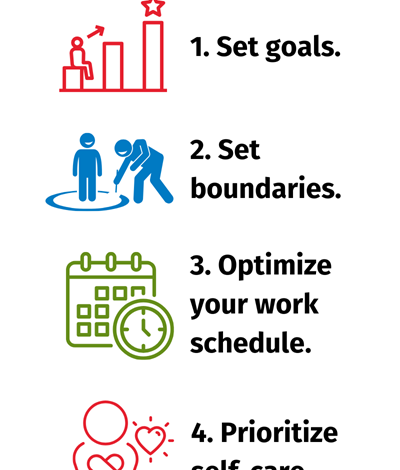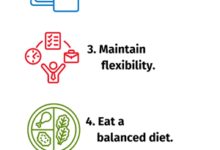Five Tips To Achieve Work-Life Balance as a Nurse

Nursing is a gratifying but highly challenging and demanding profession with many physical and emotional demands, complex and varying responsibilities, management of high-stress situations, and constant education and adaptation to changes in the healthcare system. Developing a work-life balance amongst nurses is crucial to preventing burnout, fostering one’s physical and mental health, maintaining job satisfaction, sustaining personal and professional relationships, and delivering high-quality patient care. To many, achieving work-life balance feels unattainable due to demanding personal/professional schedules, long or rotating shifts, and the emotional toll of patient care, but it is possible! Here are five tips for developing and maintaining work-life balance as a registered nurse.
- Set your goals: When looking to achieve work-life balance, it is important to ask yourself what matters most to you in life. This can be both professional and/or personal and includes spending more time with family and friends, finding a new hobby, getting involved in your community, spending more time outside, or even furthering education. Understanding your priorities can help you to set realistic goals and help to manage your precious time effectively.
- Set boundaries and learn when to say “no”: As nurses, we always want to help everyone, including our family, friends, patients, coworkers, and even strangers, but sometimes we forget how to take care of ourselves and our mental health. Know your limits physically, emotionally, and professionally, and speak up when you are feeling overwhelmed. Be direct about your availability and workload. Overtime shifts can be great when payday hits, but they can also take a huge toll!
- Optimize your work schedule: Find a facility, job, and schedule that works for you. I realize that not all schedules are perfect (trust me) but finding a workplace that values who you are outside of those four walls is paramount to finding balance! If rotating shifts, do your best to advocate for yourself to space out the rotation to ensure adequate rest and relaxation.
- Prioritize Self-Care: Whatever this looks like for you, it is vital to your routine. By investing in yourself, you can better handle the demands of your busy life and achieve a better work-life balance. This can include eating a well-balanced and healthy diet, joining a gym or exercise program, nurturing in a hobby or activity that makes you happy, or finding ways to relax on your days off!
- Ask for help: It is important, both personally and professionally, to know your limits and ask for help when you are feeling overwhelmed. Doing so can help you to create stronger relationships with colleagues, enhance your job performance, and ease personal stressors outside of work.
Achieving work-life balance in nursing isn’t easy. Still, it is important to sustain a nurse’s mental, physical, and emotional well-being, reduce burnout, promote career satisfaction, and improve patient outcomes.
.png.aspx)






